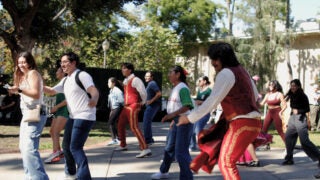USC’s Helenes Mark a Century of Service, Spirit and Sisterhood
The group supports all manner of initiatives that improve life on campus and off, but its members also benefit, often establishing lifelong friendships that continue long after they have graduated.
As storied histories go, USC’s Helenes have a 100-year legacy of Trojan pride to draw on. The group was formed by Arabella De Oliviera Conger with her classmates, and they started as the Amazons. Inspired by Helen of Troy, they switched to their current name in 1969 and remain one of the oldest service organizations on campus.
As the official hostesses of the university, Helenes honor USC’s traditions through three pillars: service to the community, school spirit and sisterhood. To celebrate the group’s century of service, former members share how the Helenes changed their student life—and beyond.
Service
When Kathryn Dullerud arrived at USC as a freshman from Champaign-Urbana, Illinois, she found college life in a big city a bit overwhelming. Remembering her service-oriented high school years, Dullerud’s sister, a fellow Trojan, thought joining the Helenes might help her find her footing. Soon, Dullerud was waking at sunrise to volunteer with the Helenes at the Los Angeles Food Bank.
Now a senior, Dullerud served a term as president and continues to dive into the organization’s volunteer activities at Community Services Unlimited/Expo Urban Mini Farm, 32nd Street School and Downtown Women’s Center.
Not only do I have a deep love for USC, I wanted to continue the tradition of service I’d established in my youth.
Alyson Kil
It was the Helenes’ volunteering opportunities like these that spoke to Alyson Kil ’10, MD ’14 too. “Not only do I have a deep love for USC, I wanted to continue the tradition of service I’d established in my youth,” Kil says. “Learning that the Helenes represent USC in greater Los Angeles and throughout the state was huge for me.”
L’Cena Brunskill Rice ’53, MA ’59 still has fond memories of the group’s service projects including organizing orientation programs. “To welcome international female students to the university, we’d take them to iconic Los Angeles sites—Griffith Park, the Natural History Museum and dinner at El Cholo, Los Angeles’ first Mexican restaurant.”
For Stephanie Paggi ’74, MS ’77, EdD ’90, joining the Helenes was a way of saying thank you to the university. “I was fortunate to have full tuition with an academic merit scholarship to USC,” she says. “Becoming involved in Helenes and participating in the volunteerism was my way of giving back.”
Spirit
Attend a Trojan athletics event and cheers from the Helenes ring through the crowd. A huge sports fan, Kil signed up for every Gate Call, a lottery system for front row tickets. “My name was chosen for the Washington State game,” she remembers. “Not only did I have the privilege of sitting on the sidelines, but the Helenes helped the Trojan Knights guard the Victory Bell.” A bonus: “We crushed Washington State.”
One of Rice’s favorite activities was joining the Trojan Knights at the Los Angeles Memorial Coliseum. “We’d arrive before the gates opened to set up card stunts at the 50-yard-line,” she remembers. “We didn’t win often during my first three years, so it was important to root the team on. It all paid off—we beat Wisconsin at the 1953 Rose Bowl.”
Since 2017, the Helenes have instituted a new tradition for UCLA football games: Hecuba Watch. “While the Trojan Knights are guarding the Tommy Trojan statue during Rivalry Week, we camp out in front of the Hecuba statue at USC Village and protect her 24/7 leading up to game day,” Dullerud says.
Sisterhood
While attending a women’s awards program at school, Rice heard her name called. She’d been chosen to join the Amazons. “Someone nominated me,” she says of the surprise. Little did she know that she’d meet some of her lifelong friends through the group. Sixty-nine years after her introduction to the Helenes, Rice says, “There are at least 10 of us who continue to volunteer together at USC.” She counts this as one of the reasons she recommends joining the organization: “You’ll have friends for life.”
I knew being a Helene would be life-changing. As a sisterhood with a strong pride for USC and an interest in service and leadership, the Helenes embodied my core values.
Alyson Kil
Kil remembers facing stiff competition to become a Helene: Only one out of every four applicants is accepted. Passing a test about USC traditions and history with at least a 90% score is required. So is an interview with the executive board. It wasn’t until she walked into her dorm room and was greeted by a welcome poster that she learned she’d made the cut. “I knew being a Helene would be life-changing,” Kil says. “As a sisterhood with a strong pride for USC and an interest in service and leadership, the Helenes embodied my core values.”
Paggi’s fondest memory isn’t of a specific event, it’s about people. “The Helenes became my Trojan family,” she says. She connected with even more Trojans during alumni events where members helped host campus guests. “Being a Helene gives you unique and beneficial opportunities that form you as a person as you go forth into the future.”
Dullerud couldn’t agree more. “I found my USC family through the Helenes,” she says. “It’s a wonderful feeling to give back to an organization that has shaped and given so much to me. Especially in this year, our 100th, which is so important in the Helenes’ history.”



